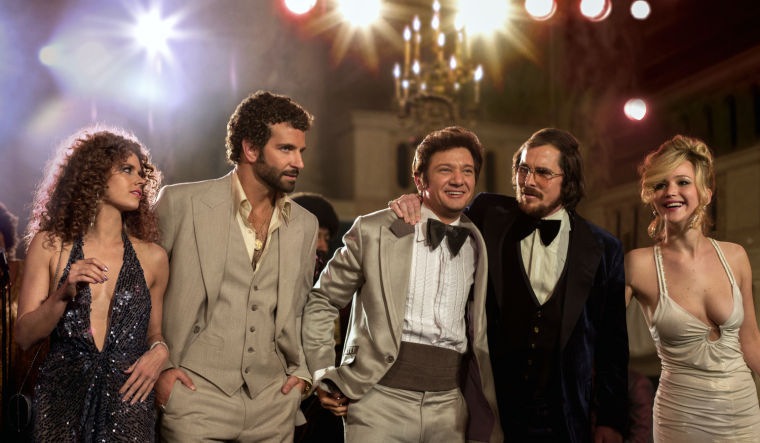“American Hustle” worth seeing — but not twice
This film image released by Sony Pictures shows, from left, Amy Adams, Bradley Cooper, Jeremy Renner, Christian Bale and Jennifer Lawrence in a scene from “American Hustle.”
December 20, 2013
Batman with a beer belly, Bradley Cooper with curlers and Robert De Niro working his mob game wasn’t enough to con me into believing “American Hustle” is the movie of the year.
With 13 nominations for the Critics’ Choice Movie Awards, I had high hopes for this crime comedy-drama. But as relationships in the film developed tensions, the movie created its own strain on a much bigger scale.
“American Hustle” is a somewhat true movie about a con man, Irving Rosenfeld (Christian Bale), and his partner and lover, Sydney Prosser (Amy Adams), being forced to work with FBI agent Richie DiMaso (Cooper) to bust Jersey powerbrokers. This controversial sting operation, called Abscam, convicted a senator, six members of the House of Representatives and other politicians involved in public corruption during the late ’70s and early ’80s.
The plot was way more complex than I just described, and that’s where my agitation arose. I commend director David O. Russell for being very aware of the difficulties of telling as elaborate a story as the Abscam tale is. He clearly didn’t want to confuse viewers with this detailed and complicated storyline; however, I think he might have overreacted by having a pretty slow rate of the film from beginning to end.
The first scene is Irving putting on a small hairpiece, combing his hair and getting dressed. Most of these shots last 10-12 seconds before jumping to another shot. The strategic camerawork of the first scene sets the precedent that viewers shouldn’t expect any intense, action-packed clips. Even Irving and Richie’s heart-racing conversation with the terrifying mobster Victor Tellegio (De Niro) is a quiet, unhurried scene.
It was easy to get impatient with this slow pace, but if the plot were any faster, the information would become overwhelming to comprehend. I found myself in this weird position thinking, “I wish this would speed up but understand why Russell is doing this.” I didn’t like having that feeling for two hours.
One way this could have been resolved is to intertwine the dynamic relationships of Irving, Sidney and Richie within the story differently.
Russell, who surprisingly didn’t start making well-known films until age 35, is phenomenal at developing genuine relationships with characters. Russell definitely took some lessons from his AFI Movie of the Year “Silver Linings Playbook,” which stars Cooper and Lawrence, and applied some of the hardships of love to “American Hustle.”
Unfortunately, with this love for depicting intimate relationships came a downfall. For the first hour or so, the movie seemed to mostly be about the relationships of the characters with a little bit of the con job plot sprinkled on top. The last 45 minutes of “Hustle” felt like it was mostly the con job plot with less of the relationships being stressed.
This black-and-white approach is what gave the plot an overly systematic feeling. I kept imagining someone on set saying, “Did we explain all the relationship stuff with those voiceovers? Sweet. Now let’s tackle this con job story.”
Bale, Adams, Cooper and Jennifer Lawrence brought incredibly diverse characters to the film. Where Richie is a good looking (full head of hair) chatterbox who is relatively new to the con world, Irving is an out of shape, balding hustler who has known the game for years. Sydney is incredibly smart and will do anything to get away from the life she had. This contrasts Irving’s naïve wife, Rosalyn (Lawrence), who will do anything to stick with the family she has with Irving.
Still, all four depend on two important themes: survival and love. Irving and Sydney base their decisions on survival. For the two, it’s less about conning people and more about getting out alive. Survival for Rosalyn is not getting a divorce with Irving. To survive for Richie is to complete the sting operation without his superiors kicking him off the case.
Most protagonists in crime/mobster movies — like Michael from “The Godfather” and Henry from “Goodfellas” — pride themselves on their independence. When placed in a stressful situation, these characters rarely seek advice from a loved one. “Hustle” really flaunted dependent characters. They desperately seek the approval of their lovers and viciously seek validation from them, too. Whether at the dry cleaners, the dance floor or at home, each character has a vulnerable moment discovering love in their life.
Despite natural and realistic acting, I still couldn’t get past the loitering pace and blatant “one hour love, one hour con” storyline of “American Hustle.” Although this is one of the better films of 2013, I can’t picture myself wanting to see it again.







